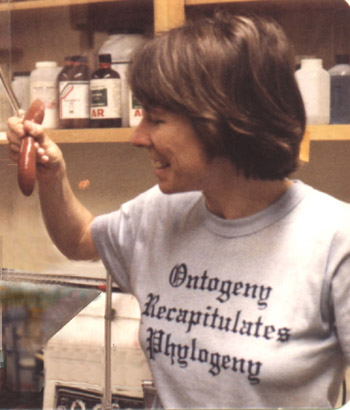UCSD Biologist, Beloved Teacher Dies
March 24, 2006
By: Kim McDonald

Meredith Gould
Meredith Gould, a lecturer in the Section of Cell and Developmental Biology at UCSD, and a former faculty member at the Universidad Autónoma de Baja California (UABC) in Ensenada, who worked tirelessly to develop intellectually rewarding laboratory experiences for undergraduates, died on March 19 in San Diego, CA from a brain tumor. She was 66.
Gould was elected as a fellow to the American Association for the Advancement of Science in 1997 for her work on invertebrate egg fertilization and development. She published 50 scientific papers, most appearing in top peer-reviewed journals in her field. Throughout her career she was dedicated to teaching, especially designing courses that would give undergraduates the opportunity to develop and test scientific questions that arose from their own curiosity. She taught a diverse range of laboratory courses at UCSD, including Plant Molecular Genetics, Embryology and Biochemical Techniques, all with excellent student reviews. She was awarded three teaching awards during her tenure at UCSD.
"Students consistently raved about Meredith's concern for their learning, her accessibility, and especially, her approachable demeanor and sense of humor," said Mandy Butler, the academic coordinator for undergraduate laboratories in UCSD's Division of Biological Sciences. "Meredith's relationship with the undergraduate lab technical staff was also excellent. Their great respect for the depth and breadth of her knowledge was unanimous, and they appreciated her laid back and unflappable disposition while supporting her during the labs."
"Flat out, the professor was the most kind, helpful teacher I have ever had in my entire academic career. She was always available and eager to help at the drop of a hat," wrote one student on a course evaluation. Another commented "She has shown the most genuine care and concern for students' learning and enjoyment of science out of all my profs here at UCSD." In a personal note another wrote "I just want to take a few moments to express my appreciation toward your patience in teaching and your time in clarifying material in class and during your office hours for me. Your class is truly fun yet challenging and productive. You have encouraged me to take more lab courses in the near future; before, I used to think that lab classes were dull and they didn't have any purpose, but now, I am looking forward for more."
Gould first came to UCSD in 1970 as a postgraduate researcher with Dan Lindsley, a professor of biology, after she had completed postdoctoral research at the University of Washington, Seattle and the University of British Columbia, Vancouver. She earned her bachelor of arts in zoology from Mt. Holyoke College and her Ph.D. in biology from Stanford University. She later became a lecturer and then an associate professor of biology at UCSD. Her interest in minority students was a major factor in her move to Mexico in 1984, where she taught at Universidad Nacional Autónoma de México in Mexico City until 1986. From 1986 to 2002 she was a professor at the Universidad Autónoma de Baja California in Ensenada, while remaining an adjunct professor at UCSD. She returned to teach at UCSD full-time in 2002.
Her research focused on egg fertilization and development in the marine invertebrate worm Urechis caupo. In particular, Gould and colleagues unraveled important steps in the complex molecular mechanisms by which sperm initiate the development of the egg. Her election to the AAAS was for showing how fertilization induces electrical changes in the egg that prevent additional sperm from fusing. She also recently began a project with undergraduate students at UABC in Ensenada to combat Pierce's disease in grape plants.
Gould dedicated a large amount of time and energy to bring modern techniques in biology to students in Mexico. In June of 2005, she and Maarten Chrispeels, professor of biology at UCSD, took the lead in organizing a workshop on crop biotechnology at UABC for undergraduate and graduate students and professors from all over Mexico. Her husband and long-time research collaborator, UABC professor José Luis Stephano, and several other UCSD faculty and graduate students also participated. Robert Schmidt, a biology professor at UCSD who helped conduct the workshop, described Gould as "a ball of energy who worked from early morning until late evening prepare the labs and help the students."
Future generations of students in Mexico and at UCSD will benefit from Gould's influence. For example, most of UCSD's thousands of biology majors will take Biochemical Techniques, a course Gould re-vamped to make more experimental and rewarding for students.
"We will miss her personally and will remember her many contributions to our Division and the betterment of undergraduate education at UCSD," said Richard Firtel, professor and chair of the Section of Cell and Developmental Biology.
